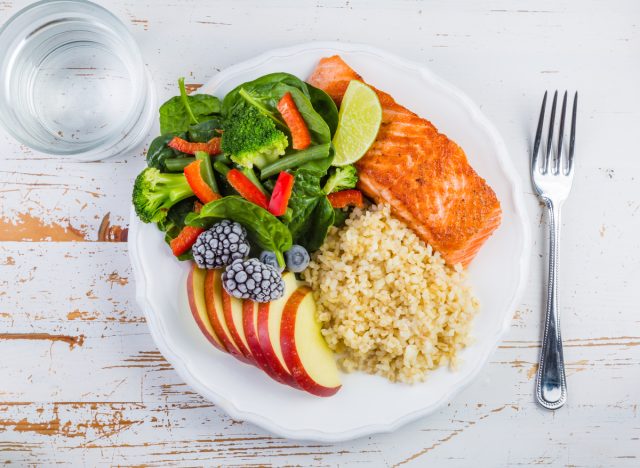There are many opinions when it comes to red meat consumption. While devoted carnivores stock up on beef, lamb, and pork, others won’t go near it because they’ve been told it may take a negative toll on their health. But even if these products do offer some substantial benefits, such as high amounts of protein and various essential nutrients, is it worth eating every day? Or are there more negative effects that you should be wary of?
According to the World Cancer Research Fund, you should not be eating more than three servings of red meat a week, which is about 12 to 18 ounces when cooked. If you devour any more than that, you might experience some negative side effects. We reached out to two registered dietitian experts to discover what the ugly side effects of eating red meat every day might be. For more on protein, check out The #1 Best Meat For Your Health, New Study Suggests.
It can take a toll on your heart.
One of the most common side effects you may hear when eating red meat is that your heart gets the brunt of it. According to Lisa Young, PhD, RDN, author of Finally Full, Finally Slim and The Portion Teller Plan, that’s the truth.
“Diets high in red and processed meats are associated with an increased risk of cardiovascular disease (CVD),” she says.
A recent study suggested that eating about 1.1 servings per day of red meat, including beef, pork, bison, and venison, was connected to a 22% higher chance of atherosclerotic CVD.
You’ll consume a high amount of saturated fat.
Saturated fats are found in most animal products. And yes, that includes red meat.
“Most red meat contains high amounts of saturated fats,” says Sydney Greene, MS, RD. “For example, a three-ounce piece of ribeye steak contains roughly eight grams of saturated fat which is about 40% of the suggested daily intake. Saturated fat intake raises the amount of LDL cholesterol in the body which is associated with a higher risk of heart disease.”
To further add to the issue, Dr. Young advises that high saturated fat levels may contribute to atherosclerosis, which is a “build-up of cholesterol plaque in the walls of arteries obstructing blood flow,” according to the Mayo Clinic.
You’ll ingest a higher amount of calories.
Aside from the fact that saturated fat can take a serious toll on your health by messing with cholesterol levels, it can also contribute to more calories, leading to weight gain, Dr. Young advises.
One 8-ounce steak is 614 calories with a total fat count of 46 grams—that’s 66% of your daily value based on a 2,000-calorie diet.
“Diets high in animal products, especially red meat, may contribute to the increased incidence of obesity,” Dr. Young says. “Obesity in and of itself is a risk factor for CVD, diabetes, and cancer.”
Your gut takes a hit.
Saturated fat in red meat can negatively affect both your heart and your gut microbiome—the community of microorganisms that live in your gut and have an effect on your immunity, cognition, digestion, and more.
READ RELATED: Madonna Looks So Fit at 64 and These Are Her Secrets
“In addition to saturated fats contributing to an increased risk for heart disease, emerging research is examining how red meat affects bacteria in the gut,” explains Greene. And red meat’s effect on your gut can, in turn, impact your heart. “During digestion and absorption, it appears that a metabolite produced by gut microbes is associated with cardiovascular disease,” Greene says.
Watch out for inflammation.
“Although the exact reasons are hard to pin down, intake of red meat is also associated with inflammatory biomarkers that can end up increasing the risk of developing chronic disease,” says Greene.
The Cleveland Clinic notes that red meat may contribute to inflammation thanks to its saturated fat content. Furthermore, Dr. Young suggests red meat can also lead to certain cancers, which have been previously related to inflammation.
In a study published in the Journal of the American College of Nutrition, research suggests that consuming red and processed meats may be linked to cancers “through an inflammatory pathway.”
You’ll have digestion issues.
With all the controversy behind eating red meat, you rarely hear about what it can to do your stomach.
“Having red meat daily as your main source of protein could be affecting digestive health,” says Greene. “Red meat tends to be a fattier protein which can cause unpleasant gastrointestinal symptoms for some who have difficulty digesting fat.”
Due to this, Green says that developing reflux and diarrhea is the result of a higher-fat diet. These may not be everyone’s symptoms, but if you are having funky stomach issues, daily red meat could be the reason why.
Your sodium intake will increase.
Red meats come in more than just cuts you can pick up from the butcher. You can find processed versions at the deli counter or refrigerated aisle, prepacked and loaded with additives.
“Processed red meats, like bacon and sausage, are also higher in sodium and preservatives which could have negative effects on health,” says Dr. Young.
According to the American Heart Association, it’s recommended a person eats at most 2,300 milligrams (mg) of sodium a day. Just one sausage link consists of 569 milligrams of sodium, which is almost a quarter of the way to your maximum intake for the day. Although it may make your food taste better, too much of this mineral can lead to issues like kidney issues, weight gain, and high blood pressure.
Other protein choices to consider


If you are worried about developing any of these health issues, it might be time to cut back on red meat. But don’t worry, there are still tons of other protein options available that may have the opposite effects on you. And yes, it’s more than just tofu and a handful of nuts.
“Leaner meats like chicken, turkey, and fish are associated with a lower risk for many chronic diseases because these proteins are low in saturated fatty acids and cholesterol,” says Greene. “Many types of fish can actually be protective against heart disease because it is rich in omega-3 fatty acids.”
Source:











